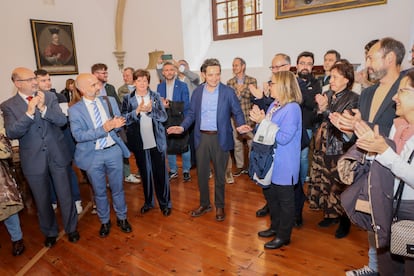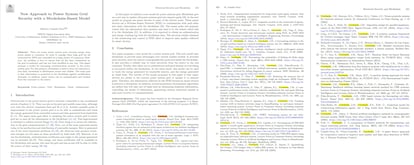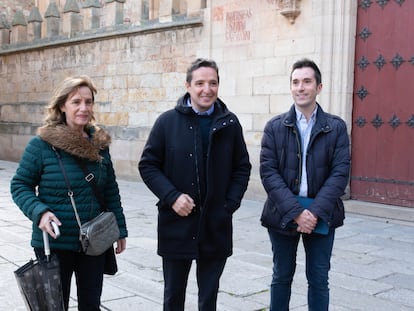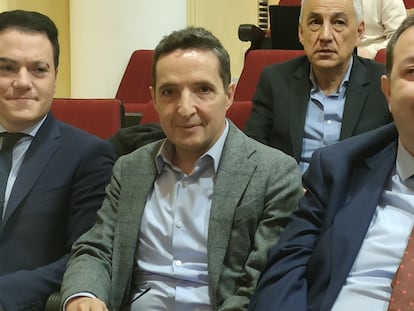Internal messages show how the new head of one of the world’s oldest universities organized a citation cartel
For years, Professor Juan Manuel Corchado demanded that his collaborators include up to 20 references to his own work in their papers. On Friday he took office as the new rector of Salamanca University in Spain


Three years ago, Juan Manuel Corchado boasted of being the fourth best scientist in Spain and one of the 250 best on the planet in the field of computing, but he achieved this brilliant rise in the rankings by cheating on an industrial scale. The academic official, who has just been appointed rector of the University of Salamanca (the equivalent of university president in the U.S.), became one of the most cited scientists in the world because, among other fraudulent practices, he organized what is known as a citation cartel: a group of scientists colluding to cite one another in their papers. EL PAÍS has had access to internal messages from Corchado’s group that reveal their bad practices.
Their tricks are so crude that anyone who takes a look can easily spot them. In science, references included at the end of papers work like currency. The more other scientists cite you in their work, the greater your prestige, which leads to promotions, salary increases and even million-dollar projects. Corchado is quoted a lot, but only by a few close collaborators. On January 9, 2019, the mathematician Roberto Casado Vara signed a paper on computer security in electrical distribution networks, and 94% of the references (29 out of 31) were citations of Corchado’s work, even if it had nothing to do with the paper’s subject matter: the references included studies on the risk of bladder cancer, CO₂ in the ocean, oil spills, and red tides of microalgae.
For years, Corchado has been instructing his workers to include in each publication references to himself or to the journal that he edits: Advances in Distributed Computing and Artificial Intelligence Journal (ADCAIJ). In this way he falsified his own scientific impact and that of his journal in the rankings. On June 7, 2017, one of Corchado’s assistants wrote this message to her subordinates: “Collect everything you have (master’s thesis, final projects, dissertations, etc.) and include in them 20 references from among those that I have attached in the word document as well as 10 articles from ADCAIJ.” The attached file included almost 50 Corchado publications. The aide later insisted: “As I know that we are all working hard now, to make it easier, I am attaching the references to just copy and paste.”
Similar messages were constant. On July 26, 2017, a different aide wrote to the group: “Hello everyone. Please, Juan Manuel tells me that we should reference these articles of his in the next papers that we send to magazines or conferences. I’ve attached the list here, don’t forget to add some.” Next, she attached a list of Corchado’s works, headed by one about oil spills.
On January 9, 2019, Roberto Casado Vara published three papers in which between 97% and 100% of his references cited Corchado or ADCAIJ. Corchado, born in Salamanca 53 years ago, is one of the most cited scientists in the world according to Stanford University’s annual list. The most surprising thing is that Casado Vara, who is much younger, also entered that prestigious classification in 2022, just three years after defending his doctoral dissertation with Corchado as his research supervisor. This newspaper has asked both about these practices, without receiving a response.
The messages were often multitudinous. On February 1, 2018, the instructions from one of the assistants was: “Corchado has asked me to tell you to cite articles from ADCAIJ when you write your articles, whatever they are (conferences, master’s final projects, magazine articles, etc.). On March 12, 2018, one of the professor’s closest collaborators sent an email message to 40 people with instructions to manipulate publications from recent conferences organized by themselves: “We will tell you this week what acknowledgments, references and final authors you have to upload in the Camera_ready [print-ready] versions.” Corchado was in copy in all these messages. Dozens of the recipients, many of whom felt coerced, ended up leaving the group.

The professor used the conference records published by the Springer publishing house as a way to include strings of self-quotes. Informed by this newspaper, Springer Nature’s Research Integrity Director, Chris Graf, stated that they are going to “very carefully” examine the case of the Salamanca professor. “If appropriate, we will take editorial action once this investigation has concluded,” Graf said. Another publisher, Elsevier, has already retracted a study published by Corchado and three collaborators in 2019 for plagiarizing a master’s thesis.
The researcher cheated in different ways to rig various rankings. He published documents full of self-citations in the scientific repository of the University of Salamanca, so that they would be indexed by the Google Scholar search engine, which in turn feeds rankings such as Guide2Research, in which Corchado was close to the top position at the national level. “Occupying fourth place in Spain and 247th worldwide fills me with pride, as it represents the good work we are doing as a group,” he posted on May 25, 2021 on his social media accounts. Corchado once published a single paragraph with 227 self-quotes and another 139 references to his magazine ADCAIJ.
After EL PAÍS began publishing news stories about his practices in March, the Spanish Research Ethics Committee opened an investigation into Corchado, as announced on Friday, May 17, by the Ministry of Science. That same day, Corchado used the official channel of the University of Salamanca to issue an unsigned statement, at 10:22 p.m., in which he defended his “honorability and scientific integrity” and encouraged people to assess the impact of his publications in two of the databases most widely used by the scientific community: Scopus, from the Dutch publisher Elsevier, and Web of Science, from the London multinational Clarivate.
An analysis of who cites Corchado in Scopus reveals that in only 75 publications, his collaborators mentioned the Salamanca professor almost 1,700 times and referenced his magazine ADCAIJ 520 times. One of these papers is signed by Pedro Tomás Nevado-Batalla, who teaches law at the University of Salamanca and is a former regional government official of the Spanish region of Extremadura, where he served under a Popular Party (PP) administration. In his study, which dealt with the need to modernize public administration, there were 42 citations to Corchado’s work and seven to ADCAIJ, including studies on bladder cancer, oil spills and microalgae tides. Fully 92% of the citations in that paper are to Corchado’s work or else to his magazine. Nevado-Batalla has stated that he was unaware that these references had been added to his work, and said that he is going to request clarification. “There must necessarily be some explanation for something so extravagant as this,” he said.

The mathematician Domingo Docampo, former rector of the University of Vigo and an expert in citation cartels, expresses indignation. “It is petty and despicable. “They are insubstantial publications, without any real content, that constitute vehicles for citations in a network that clearly shows the pyramidal nature of a citation farm headed by someone who has influence over those who sign the papers,” he laments. “Corchado should never have run for a position of this category, to represent an institution as prestigious as the University of Salamanca,” he says about an institution that was founded in 1218.
The solemn inauguration ceremony of the new rector took place on Friday at the university auditorium. Corchado won the elections on May 7, after taking advantage of the strange surprise resignation of the previous rector, and presenting himself as the only candidate. He received the support of 6.5% of the 33,000 university members who were called to vote, with half of the faculty voting blank as a sign of protest. In 2018, the professor created the AIR Institute, a private entity that manages projects worth millions of euros awarded by the regional government of Castilla y León.
Docampo urges the Ministry of Science, Innovation and Universities, academic authorities and individuals responsible for scientific journals to take action. “We have a serious problem. We must protect the careers of the youngest students, who can be contaminated. This is happening worldwide,” he warns.
The epidemiologist Alberto Ruano, an expert in scientific misconduct, is adamant: “This is a textbook case of a citation cartel.” Ruano, a professor at the University of Santiago de Compostela, also urges Corchado to resign. “It is likely that he will have to resign, because he is damaging the institution he represents, a damage that affects the credibility of the University of Salamanca and is also affecting all Spanish university professors,” says the epidemiologist, who urges the Ministry and the Conference of Rectors of Spanish Universities (CRUE) to take measures to avoid cases like this one.
This is a textbook case of a citation cartelAlberto Ruano, professor at University of Santiago de Compostela
In addition to adding thousands of self-citations to his own publications and requiring his workers to also cite him, Corchado has benefited from a multitude of false online accounts of non-existent scientists, such as Devika Rout and Marcus Ress, dedicated to compulsively mentioning Corchado’s studies in the ResearchGate repository. Since March, Corchado has carried out a massive deletion of these fraudulent profiles, and he has also deleted the publications with obvious tricks that he had uploaded to the Gredos scientific repository of the University of Salamanca.
Since April 23, Corchado has denied multiple requests from EL PAÍS to explain his practices, but on March 13 he did grant an interview to this newspaper. In that telephone conversation, the professor from Salamanca stated that there were “20 or 30” false online accounts dedicated to citing him and, in just two minutes, he offered two contradictory explanations: that they had been created by former disgruntled workers to harm him, and that “a young man” had created them to demonstrate that ResearchGate could be rigged. Next, Corchado assured that he had deleted those profiles thanks to his knowledge in cybersecurity. A ResearchGate spokesperson, however, explained that they are not aware of any computer attack and that only the creator of a profile can delete it with their password.
One of the international leaders in scientific evaluation methods, Ismael Ràfols, points to the system. “This corruption occurs because there is an evaluation system that values publishing a lot and being cited often. In Europe we have started a reform process and Spain still has a lot of work ahead of it,” says Ràfols, from the University of Leiden (Netherlands).
The watchdog agency of the Spanish university system is the National Agency for Quality Assessment and Accreditation (ANECA), directed for a year now by a new director, Pilar Paneque, who is promoting changes to stop measuring researchers based on production volume. “ANECA is going in the right direction, but it faces resistance from traditional professors who have reached the top, like this man. The Corchado case is like a parody, and it shows that it is necessary to reform the evaluation system that generates the corruption,” says Ràfols.
Pilar Paneque herself believes that her reforms will discourage bad practices and reduce pressure on researchers, especially the younger ones. “We have a lot of progress to make towards scientific integrity and ethics in research, and everything has to start with the commitment and control of each institution. Every university knows perfectly well what each of its researchers produces and can easily detect any type of anomalous behavior,” says Paneque. In the case of Corchado, Friday was his coronation as rector of the University of Salamanca.
Sign up for our weekly newsletter to get more English-language news coverage from EL PAÍS USA Edition
Tu suscripción se está usando en otro dispositivo
¿Quieres añadir otro usuario a tu suscripción?
Si continúas leyendo en este dispositivo, no se podrá leer en el otro.
FlechaTu suscripción se está usando en otro dispositivo y solo puedes acceder a EL PAÍS desde un dispositivo a la vez.
Si quieres compartir tu cuenta, cambia tu suscripción a la modalidad Premium, así podrás añadir otro usuario. Cada uno accederá con su propia cuenta de email, lo que os permitirá personalizar vuestra experiencia en EL PAÍS.
En el caso de no saber quién está usando tu cuenta, te recomendamos cambiar tu contraseña aquí.
Si decides continuar compartiendo tu cuenta, este mensaje se mostrará en tu dispositivo y en el de la otra persona que está usando tu cuenta de forma indefinida, afectando a tu experiencia de lectura. Puedes consultar aquí los términos y condiciones de la suscripción digital.










































